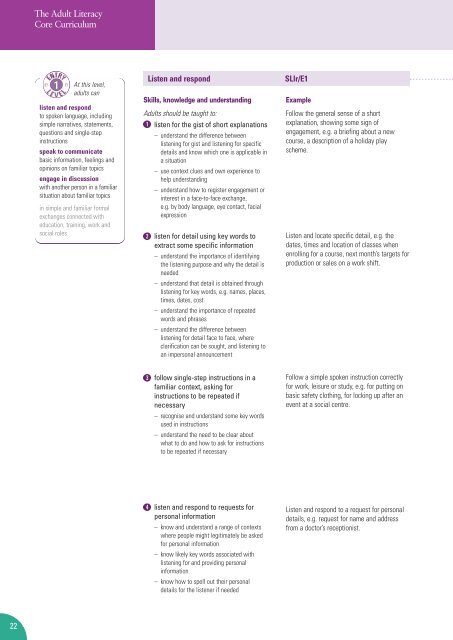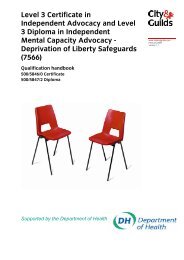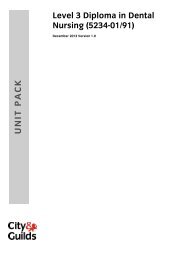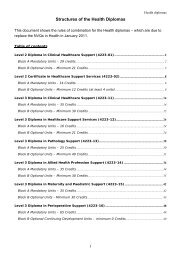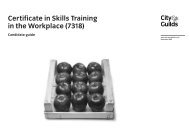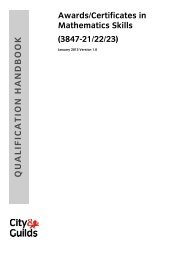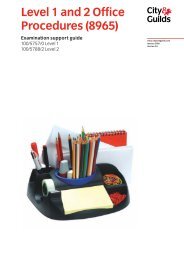Adult Literacy Core Curriculum - Nationally developed Skills for Life ...
Adult Literacy Core Curriculum - Nationally developed Skills for Life ...
Adult Literacy Core Curriculum - Nationally developed Skills for Life ...
You also want an ePaper? Increase the reach of your titles
YUMPU automatically turns print PDFs into web optimized ePapers that Google loves.
22<br />
The <strong>Adult</strong> Basic <strong>Literacy</strong> <strong>Skills</strong><br />
<strong>Core</strong> <strong>Curriculum</strong><br />
At this level,<br />
adults can<br />
listen and respond<br />
to spoken language, including<br />
simple narratives, statements,<br />
questions and single-step<br />
instructions<br />
speak to communicate<br />
basic in<strong>for</strong>mation, feelings and<br />
opinions on familiar topics<br />
engage in discussion<br />
with another person in a familiar<br />
situation about familiar topics<br />
in simple and familiar <strong>for</strong>mal<br />
exchanges connected with<br />
education, training, work and<br />
social roles<br />
Listen and respond SLlr/E1<br />
<strong>Skills</strong>, knowledge and understanding<br />
<strong>Adult</strong>s should be taught to:<br />
1 listen <strong>for</strong> the gist of short explanations<br />
– understand the difference between<br />
listening <strong>for</strong> gist and listening <strong>for</strong> specific<br />
details and know which one is applicable in<br />
a situation<br />
– use context clues and own experience to<br />
help understanding<br />
– understand how to register engagement or<br />
interest in a face-to-face exchange,<br />
e.g. by body language, eye contact, facial<br />
expression<br />
2<br />
3<br />
4<br />
listen <strong>for</strong> detail using key words to<br />
extract some specific in<strong>for</strong>mation<br />
– understand the importance of identifying<br />
the listening purpose and why the detail is<br />
needed<br />
– understand that detail is obtained through<br />
listening <strong>for</strong> key words, e.g. names, places,<br />
times, dates, cost<br />
– understand the importance of repeated<br />
words and phrases<br />
– understand the difference between<br />
listening <strong>for</strong> detail face to face, where<br />
clarification can be sought, and listening to<br />
an impersonal announcement<br />
follow single-step instructions in a<br />
familiar context, asking <strong>for</strong><br />
instructions to be repeated if<br />
necessary<br />
– recognise and understand some key words<br />
used in instructions<br />
– understand the need to be clear about<br />
what to do and how to ask <strong>for</strong> instructions<br />
to be repeated if necessary<br />
listen and respond to requests <strong>for</strong><br />
personal in<strong>for</strong>mation<br />
– know and understand a range of contexts<br />
where people might legitimately be asked<br />
<strong>for</strong> personal in<strong>for</strong>mation<br />
– know likely key words associated with<br />
listening <strong>for</strong> and providing personal<br />
in<strong>for</strong>mation<br />
– know how to spell out their personal<br />
details <strong>for</strong> the listener if needed<br />
Example<br />
Follow the general sense of a short<br />
explanation, showing some sign of<br />
engagement, e.g. a briefing about a new<br />
course, a description of a holiday play<br />
scheme.<br />
Listen and locate specific detail, e.g. the<br />
dates, times and location of classes when<br />
enrolling <strong>for</strong> a course, next month’s targets <strong>for</strong><br />
production or sales on a work shift.<br />
Follow a simple spoken instruction correctly<br />
<strong>for</strong> work, leisure or study, e.g. <strong>for</strong> putting on<br />
basic safety clothing, <strong>for</strong> locking up after an<br />
event at a social centre.<br />
Listen and respond to a request <strong>for</strong> personal<br />
details, e.g. request <strong>for</strong> name and address<br />
from a doctor’s receptionist.


